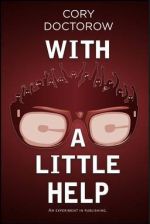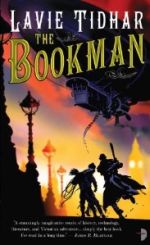An Early Adoption
At noon, I noticed the elephant flapping its wings outside the window of my third-story apartment. When it caught my eye, the elephant trumpeted, “Do I have the honor of speaking to Chandrani Mehta?”
I slid open the window. “Keep it down,” I whispered. “Who coded you? I’m going to file a harassment report.” The elephant carried a luscious howdah: a tall, golden throne surrounded by awnings and cushions of red velvet that trailed down into the street. Down below, two pedestrians slowed down, glanced up, and then hurried away from this great, big trainwreck of unreality.
The elephant flapped its wings to remain in place, but the wingbeats were leisurely when they should’ve been hummingbird fast and the featherless wings–although massive–were much smaller than they ought to have been. This thing was not only unreal; it wasn’t even self-consistent!
It said, “My mistress has seconded me to you for the day. When the appointed time arrives, you have only to step onto my back and I will convey you to her palace.”
“Your mist–Maya sent you?” How just like a newcomer.
I pulled out my phone and used a disincorporation app to erase the elephant from existence. Normally, it would be considered shockingly rude to destroy a friend’s creation, but Maya clearly had no understanding of ordinary politeness.
With the elephant gone, I breathed easier. Maybe no one from the building had even noticed it? Still, I opened my phone to send a note of apology and explanation to my building, and saw Linda’s message: Hey Maya and Sureel, I’m sorry I’m not going to be able to make it to tonight’s dinner. Last night my mother screwed up her home’s settings, and I’m going to have to spend all day helping her reconstruct it.
A naked lie, of course. She’d sent the message a few seconds ago, probably right after seeing her own elephant. Perhaps I should cancel as well? I was so tempted to stay here and optimize my chilies. I usually resisted these sorts of anti-social urges. Four years ago, I’d been such a social butterfly; it felt unreal to blow off my social engagements in order to stay home and do something as selfish and useless as coding. But surely even the old Chandrani would’ve been bored at the notion of spending an evening trying to chat with Maya.
I called up Rhodea.
“Are you still going to Maya’s place tonight?” I said.
“Of course. Why? Aren’t you?” she said.
“Didn’t you see her little ‘present’?”
“Oh, don’t be so mean. I think mine is cute. I’m going to ride it over.” Of course Rhodea could afford to let a thing like that stick around her house; she lived all alone on a tiny island.
“I already destroyed mine.”
“I’ll pick you up.”
“Don’t,” I said. “My neighbors are such unreality-prudes.”
“Oh, your neighbors are the prudes. You would never sneer at an unreal effect.”
“Maya’s place is probably some horrible Disney Castle. I tried to see it on the maps, but her neighborhood hasn’t been re-indexed yet.”
“Didn’t they put the new immigrants in Rapid City? That’s a nice place.”
“Sure, it was, but the newcomers have no doubt destroyed it through their utter disregard for visual or contextual unity.”
“Well, it’ll be fun enough to see what monstrosities they’ve erected. I’m still game if you are.”
“I suppose we have to. Could you please message her and tell her we’re still coming?”
“Them.”
“What?”
“You mean ‘them.’ You did know that she’s married to Sureel, right?”
“Still?”
“Why wouldn’t she be? They only tied the knot like six years ago.”
“I don’t see how she can be so fond of unreality and still be hanging onto a marriage.”
“Jealous much?”
“Of course not.” I felt a tendril of fear. Should I be jealous? No, why would I be? The modification had nothing to do with Sureel. Had Rhodea detected the hint of unreality in me? I massaged the back of my neck, and then I was glad that Rhodea couldn’t see the guilty gesture. This second-guessing was getting to be so tiresome; maybe it was time to remove my self-modification. If I hadn’t taken the easy way out, four years ago, then surely I would have gotten over my loneliness on my own by now…
After I hung up, I saw a strange glint in the kitchen, where the shiny rows of chilies were laying out on every available surface, drying under the heatlamps. I circled the offending tray of chilies. One of the chilies was emitting an ostensibly reflected ray of light that couldn’t be a result–not at that angle–of any of the light sources in my kitchen. When I nudged the chili to one side, the spot of light disappeared. When I nudged it back, the unreal ray returned.
I sighed. Some would say that if I insisted on hand-coding my chilies, I had to expect these sorts of bugs. I’d managed to get my latest specimen–Egyptian Blue–to 99.9% of reality using only 11,000 instructions. That was extremely good, as these things went. Of course, an AI-optimized chili would have been almost indistinguishable from reality, but even the most minor machine products are so bulky with millions of extraneous, junky instructions. Some creators believed that inefficiency didn’t matter anymore, since we had the processing power to run anything, but I wasn’t alone in thinking we should be very careful about the kind of instructions we put into our bodies.
With a tap, I exploded the chili’s code and started chasing the dancing logic clusters to try to catch the erroneous instruction.
* * *
Maya’s home was worse than I’d expected. It was a network of treehouses nestled into the uppermost branches of thousand foot tall trees. I had to ascend using an elevator set into one of the trees. Rain fell perpetually, but I never got wet. At the foot of the trees, a lake shone unrealistically bright, considering that the moon was a dim crescent. The complex was lit by impossibly dynamic torches whose dappled flickers created pools of dancing shadow that were slices of utter blackness. Thankfully, a thick fog shrouded the equally grotesque homes of the neighbors: a sorry collection of castles, palaces, cathedrals, and pyramids.
Some would have called this scene beautiful. The parts of my brain–my simulated brain–that were devoted to processing novel vistas for hints of evolutionary dangers–predator animals and foul weather and bands of marauders and such–were kicked into overdrive by the strangeness of this place. As a result, the place grabbed my attention in a way that was considered, by some, to be a pleasure.
But I thought it was tawdry and manipulative and even a little bit dangerous. Still, Maya didn’t know any better. It would be up to me and Rhodea to teach her. I’d sent Rhodea a message when my jet landed, and she–either less fastidious or more polite than I–had landed her elephant alongside me.
Sureel answered the door, looking just like himself. He was wearing the scan of his body that was usually taken just moments before the subject came inside.
“Wow,” he said. “I haven’t seen you in a really long time.”
“Eight years,” Rhodea murmured.
“I’m glad you called us!” I said.
He was staring at me. “You look really beautiful,” he said. That grated on me. It was so wrong. I’d spent months designing this shell: I’d aged my body to accurately reflect what I would have looked like if I’d spent the last eight years outside.
“You look really accurate,” Rhodea said to him.
“What?” he said.
Maya arrived before I could explain. She was wearing a sari woven out of some purely virtual material: it flowed like silk but shined like silver. That wasn’t the worst, though. In life, she’d been slightly pudgy and somewhat dark-skinned. Now she was tall, slender, high-breasted and pale. She looked like a Hindi film star.
As she said hello, she flicked her eyes over my blouse, slacks, and graying hair, then pursed her lips.
Maya showed us into her home’s grand receiving room–which was much larger on the inside than on the outside–and ushered us past a legion of jodhpur-wearing servitors. I was disgusted by the trays that the software-men were holding out. Dinner was to consist of every kind of unreality: cakes that had the consistency of clouds; stews that drifted through the air like bubbles; flickering, televisual drinks that flowed like molasses.
“Eat, eat, it’s all for you,” Maya said. “I’ve been designing for weeks.”
I looked at the trays like they were a collection of bear traps that were ready to snap shut across my simulated neurons. I sampled one of the most normal-looking items–a mooncake that was hovering slightly above the tray–and tried to smile. The cake tasted like Beethoven’s Moonlight Sonata. I wanted to spit the synaesthetic mess onto a napkin, but I forced myself to swallow it.
Maya and Sureel conducted us to their sitting room, where we were cradled by a set of spongiform shapes that supported our bodies without constraining our freedom of movement.
As I lolled in the arms of the dreadful manikin, Maya and Sureel leaned forward. They looked at each other, then at us. Rhodea took up the mantle of conversation.
“Your home is so diverse and well-coordinated,” she said. “Everything must have taken so long to prepare. How long have you been inside?”
“Only six months,” Maya said. “I guess everything we’ve done must seem pretty ordinary to you. Some of our friends have really spectacular places: one lives on an entire simulated asteroid.”
“While we were waiting to enter, Maya studied up on design,” Sureel said. “She spent months modeling all this and then using AIs to optimize it.”
I wasn’t sure I could trust myself to speak politely, but I was worried that my silence might seem unreal. “Why did you decide to move inside?” I said.
“Oh, it was time,” Maya said. “I used to read your online dispatches from inside the ‘net, back when you first came here. You made it seem so clean and fun and simple.”
“My work was slowing down, outside,” Sureel said. “No people means no need for financial advisors.”
“Even for a doctor, business was slow,” Maya said. “Mostly only the elderly were left, but even they were starting to come inside.”
Rhodea straightened up. “Well, are you enjoying your retirement?” she said.
“Oh sure,” Sureel said. His smile was just the way I remembered; he only showed his upper teeth. “Maya is always showing me new things. And she loves to cook. I could spend a lifetime exploring these strange new tastes.”
“Be careful,” I said. “Some of these unrealistic recipes tweak with the brain in strange ways. You don’t want to get hooked on something.”
There was a sharp intake of breath from Rhodea, but Sureel and Maya laughed.
“Of course there’s no real danger, right?” Maya said. “I mean…I make mistakes- things like jumping off tall things or getting mauled by the kitty -but I get put back together automatically. Nothing really bad can happen here.”
I thought about saying, “After you take some things, you don’t want to get put back together,” but Rhodea replied first.
“Of course not,” she said. Rhodea looked at me strangely. I resisted the urge to touch the back of my neck. Was I acting unrealistically? What would the unaltered Chandrani have done? Wouldn’t she have felt even more strongly about this? Perhaps that was the problem; perhaps Rhodea was afraid I was going to pursue this further.
The servitors were constantly circling us with trays of food. Maya only sampled things here and there, but Sureel gorged himself on tidbits. Rhodea picked a cocktail of incandescent gas and sometimes lifted it to her lips. I couldn’t bring myself to touch anything. I had to get away from this disgusting food.
“I’d love to see more of your home,” I said.
“Oh, let me show you around,” Maya said.
Sureel and Rhodea hung back as Maya charged forward, pulling me across rickety rope-bridges. I tried to nod along as she babbled about the place. Once, the two of us had been able to sit down in a hallway and chat for hours. Now, I couldn’t think of a word to say to her.
She was showing me a sauna room which was capable of becoming hotter than the interior of the sun when she said, “Is everything here really that bad?”
“What? No.”
“I remember that face. You’re looking at my whole life like it’s an ugly dress.”
“It’s….different from what I’m used to.”
“I know I’m just an amateur designer, but I’m anxious to learn. I’ve heard that you’re considered something of a master…”
She was looking at me with wide-open eyes. Her hands were knotted together behind her back.
“It’s just…well…everything here is so…unreal,” I said.
She emitted a short laugh. “But we’re computer programs that are being run by a giant server. Isn’t that unreal?”
“Of course, and that’s why it’s so dangerous to try and manipulate the senses the way you’re doing right now. I could sit down and scribble out a tiny bit of code–one hundred instructions–that would make your brain think that this bench, or that doorhandle, was the most beautiful thing you’d ever seen. I could write down another bit of code that would make you have more fun right now than you’ve ever had in your life.”
“But this is just a house. It’s nothing like that.”
“It is, though; the scale and strangeness of this place is just a clumsier way of tricking the brain.”
“Oh, and it’s so much better to be a dowdy old woman who reprograms spices by hand?”
“There’s a reason that my work is so well-respected,” I said.
“Sureel didn’t even look at you when we were sitting together. That was a real shock, wasn’t it?”
I didn’t mention his reaction at the door. I really hadn’t thought about Sureel all evening. I never noticed that kind of attention anymore.
“Being inside is wonderful,” I said. “It’s so peaceful and free. But our social proprieties aren’t arbitrary taboos; we have them for a reason. I saw how many invites you sent out for tonight’s gathering. There’s a reason that Arvid and Yonathan and Nicolette and Jeremias and Sonia didn’t show up. They’re gone.”
She was giving me an odd look. “We visited Jeremias just last week. He has a really interesting place. It’s a hypercuboidal structure that…”
God, she was perplexed because I’d mentioned Jeremias like he was just another person. I struggled to muster up some anger.
“Most of the time Jeremias is so zapped that he can’t tell where he ends and his house begins,” I said.
“He said he missed you. Why don’t you ever go and-”
“You’ll find out soon enough, when Sureel falls into the same trap.” I didn’t need to feign that cattiness.
Moisture was gathering at the corner of her eye. If she was going to be unreal, she might at least disable those tears.
“You were always jealous of me,” Maya said.
I tried not to smile; Maya had always aspired to be the kind of person I’d envy, but she had never succeeded. There was a crash and then the floor of the sauna rattled.
A Bengal tiger padded in. I backed away, but the creaky rope-bridge was the only way out, and I was afraid to turn my back to run across it.
The tiger nuzzled Maya’s leg. She, still crying, reached down to caress its head. The tiger growled and broke free of her. It stalked towards me. It batted at me with a paw. I dodged back.
“No, Amitabh! No!” Maya said. She pulled on its tail.
The cat hit me with its next swipe, opening a huge gash on my arm. I barely felt it; my simulated adrenaline had kicked in. I backed out over the rope-bridge.
Maya pulled again and the cat turned. It pounced on her and ripped her open. Then it sat and yowled. Maya’s body disappeared, but I was still bleeding. The cat quit yowling and stalked off the way it’d come. I took a towel from the sauna and wrapped it around the wound. Quite a lot of blood was coming out of me. The room became fuzzy and I stumbled, hitting the wall.
After what felt like hours, Sureel and Rhodea ambled in.
“Oh no, Amitabh got wild again,” he said. “Amitabh is…was… our cat. Maya put him into that tiger’s body, but he’s not used to it yet.” He took out his phone and crouched down next to me. “Don’t worry. I’ve patched up Maya tons of times.”
I knocked it out of his hand. “No!” I said. “The cut’s not serious. Find me a doctor.”
“A doctor?” he said.
Rhodea smiled. “Come on, that must hurt. Why don’t you let us-”
“Don’t any of you understand that we have these rules for a reason? They’re not some stupid game! There’s a reason you don’t let your unreality leak over into other peoples’ lives, and there’s a reason you don’t just zap away every illness. What if I was feeling sad one day and decided to zap that away? What if I decided to zap away my boredom? What if you called me and found me staring at a wall and just laughing and laughing and laughing and…”
I was still talking, but Rhodea and Sureel were having a whispered consultation.
Rhodea teleported away.
Sureel sat next to me. He held the towel to my arm while I raved.
Eventually, he said, “I won’t get hooked on anything.”
Why was he wasting my time like this? The shock was wearing off and the pain was becoming intense.
“Don’t you get so bored here?” he said. “What is there to do? I used to have only a few free hours every week. I’d play squash sometimes. But in here, there’s no reason to play. These bodies don’t need exercise to stay fit. And if I did play, then missing a shot would only be an affectation, since I could so easily download the reflexes and skills of a pro. Only eating is still fun; it’s more fun than it ever used to be. But I am not sure it’s enough.”
Anger forced away the pain. “You can do anything inside that you could have done outside. If you need external constraint in order to feel entertained then you have a slave mentality. You should go back outside until you’re ready to be free.”
“I’ve thought about leaving,” he said. “But Maya likes it here.”
That’s when she reappeared, looking whole and healthy. She was carrying a black bag.
“Sorry,” Rhodea said. “It took a little bit of searching to find a realistic set of medical supplies.”
Maya leaned over me. She was smiling. There was some kind of needle in her hand. I looked away.
“I can’t believe I’m going to stitch you up.” She laughed. “I haven’t done this since my residency.”
I gasped when she pulled away the towel. Then she went to work. Sureel’s face was the only one I could bear to look at; he was the only one who wasn’t smiling.
After aeons of stitching, she said, “You have 49 stitches. And there will definitely be a scar.”
I blanched. My body was ruined. “What will the scar look like?” I said. “How long will it be? How deep? What color? Will it have puckered edges?”
“I don’t know…” Maya said. “I could whip up some possible designs, if you want.”
Rhodea burst out laughing.
* * *
On the way home, Rhodea said, “Didn’t you go out with him?”
“Once,” I said. “He asked me to the Indian-American Society’s end-of-year formal. Afterwards, he asked if he could kiss me. I said no. A few weeks later, Maya said yes.”
“Well, now you’ve gotten a glimpse of what your life could’ve been like.”
“He’ll leave eventually.”
“Whoa, still bitter?”
“No,” I said. “Just realistic. That’s the way people are. In here, there’s no reason to stay together.”
“Well, we’re still together. I’m glad you didn’t cancel.”
“Yeah, I can’t believe Linda…”
“Were you surprised? From the moment Maya first invited us, I knew that Linda was going to cancel at the last minute.”
Rhodea accompanied me all the way home. As I was walking into my apartment, she said, “We’re having lunch tomorrow, right?”
I sent her back to her island with a jar of chilies.
The code for the Egyptian Blue was still floating around my apartment, along with a sternly-worded note, from my neighbors, cautioning me about the unreality spillover earlier today. I shunted both into storage.
Soon enough, I started getting curious/admiring messages from fellow designers who’d heard, from Rhodea, about my new venture into realistic injury and scarring. I marked their overtures for later reply.
Then I tapped at my own head, doubling myself.
I exploded the double. The room filled up with thousands of logic clusters. Each one represented millions of instructions. I pushed my way through the forest of interconnections and found what I was looking for. It was an extremely elegant cluster: 83 instructions that redirected signals from a tiny portion of my simulated brain. I unclipped the cluster and wrote a program that would automatically reattach it in ten minutes. Then I ghosted myself into the simulated double.
I’d expected the memories to slam into me, but I didn’t feel any different. Then I looked at the bookshelf. It was still full of his books. Why hadn’t I deleted them?
Why hadn’t I moved? He’d moved into his fucking hypercube; why hadn’t I been able to change, too? This place hadn’t been enough for him. What was wrong with me? Why had I been able to lie up inside it for four whole years?
I gripped the windowsill and looked outside. Everything outside was different. Nothing out there reminded me of Jeremias. Dealing with this was the right thing to do. All day I’d sensed that the alteration was making me unreal.
When the ten minutes was over, I smiled. That had been silly. What did it matter what another person chose to do with his life? What was unrealistic about me? Weren’t people supposed to feel self-sufficient? Why should I work through all that suffering, when the intended end-point was to forget about him and achieve the exact same feeling that I had right now. My self-alteration wasn’t unreal; it was just a shortcut. It had allowed me to skip all that painful healing: because of that set of instructions, I’d never again have to be lonely.
Still…I browsed through the little cluster of instructions that had re-clipped itself to my double. It was so tiny and so efficient, but couldn’t it be better? Maybe I should have shown a little more distress today?
I spread the instructions all around me. No, I didn’t have to remove the modification entirely; I just had to make it a little bit more realistic.
As I worked, messages poured in from my admirers. Everyone was intrigued by the prospect of realistic scarring. I ignored their invitations and offers of help. Today’s dinner had almost caused me to totally upset my life. Maybe it would be more real for someone of my station to be a little more circumspect about her social engagements. I took a break to jot out a message to Rhodea: Sorry. So swamped. I can’t make tomorrow’s lunch. Maybe next week?
The End
Rahul Kanakia grew up in Washington, D.C.. He graduated from Stanford University with a B.A. in Economics in 2008 and subsequently returned to D.C. to work for the World Bank on environmental operations in India, Pakistan, and Bangladesh. He currently lives in Oakland, C.A., and works as an international development consultant. In the fall of 2012, he will be starting a Master of the Fine Arts program in Creative Writing at the Johns Hopkins University Writing Seminars. He has sold short stories to Clarkesworld, Apex, the Intergalactic Medicine Show, Redstone, Nature, and Lady Churchill’s Rosebud Wristlet. He also serves as a First Reader for Strange Horizons. You can follow him on his blog, Blotter Paper, and/or his twitter feed.
























5 comments
[…] An Early Adoption by Rahul […]
Really interesting and imaginative world building. Reminded me of Kurzweil’s “Age of Spiritual Machines.” I see the theme as humans not being designed to be too happy, forced to play by rules that let us suffer. Conveyed with a nice cyberpunk/fairytale vibe. The idea of elegant and efficient code having been rendered vestigial by modern hardware made me sad.
[…] An Early Adoption by Rahul Kanakia […]
[…] An Early Adoption by Rahul Kanakia (an Indian-American gay man) […]
[…] appeared in our August 2010 edition. (I love that story). He has written another excellent piece, An Early Adoption, which involves, among many other thought-provoking ideas, the concept of constructing, coding […]